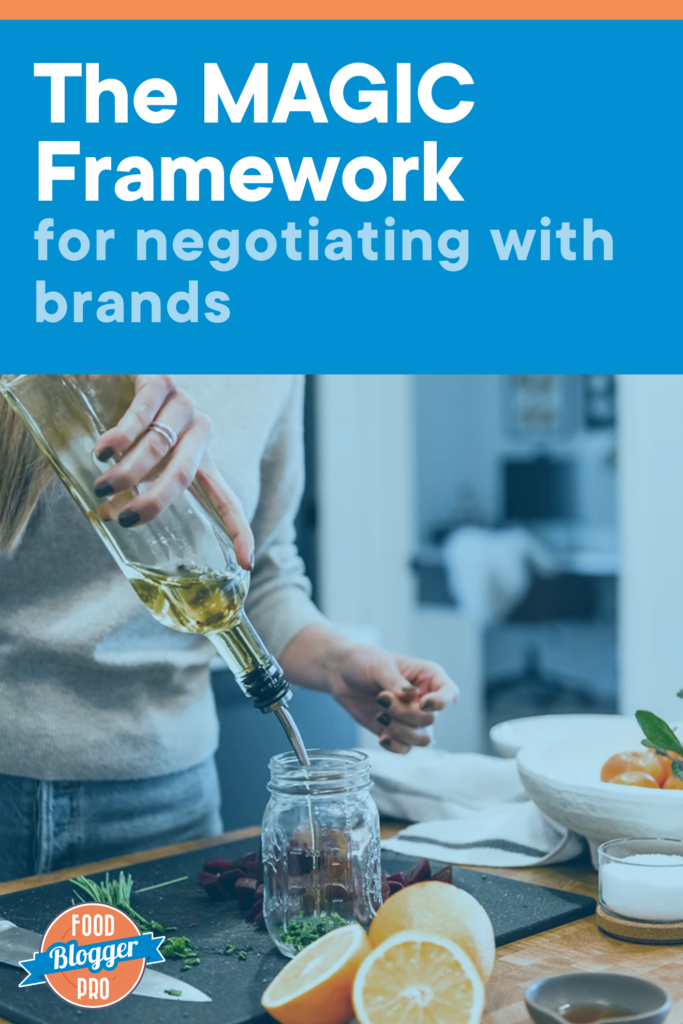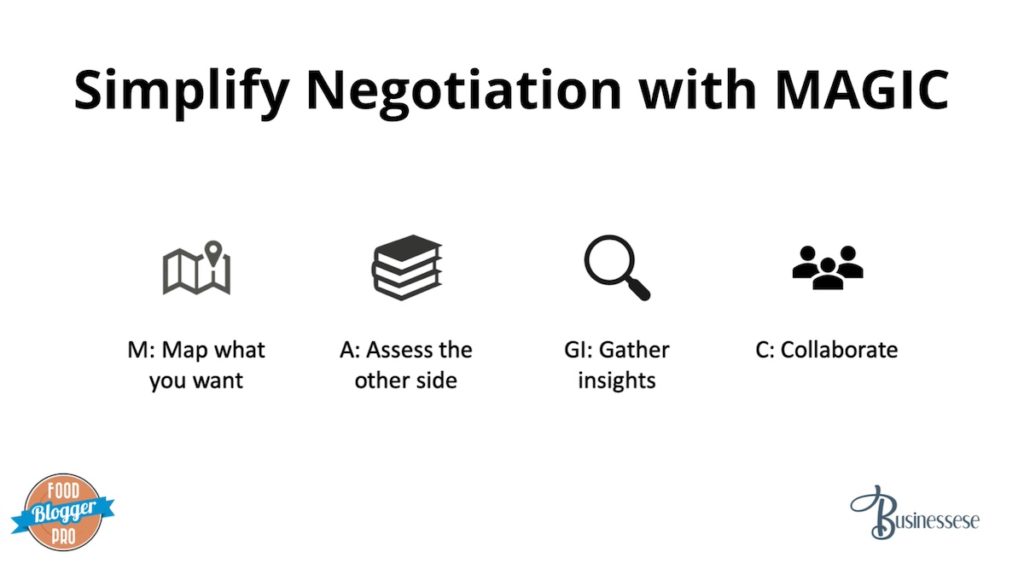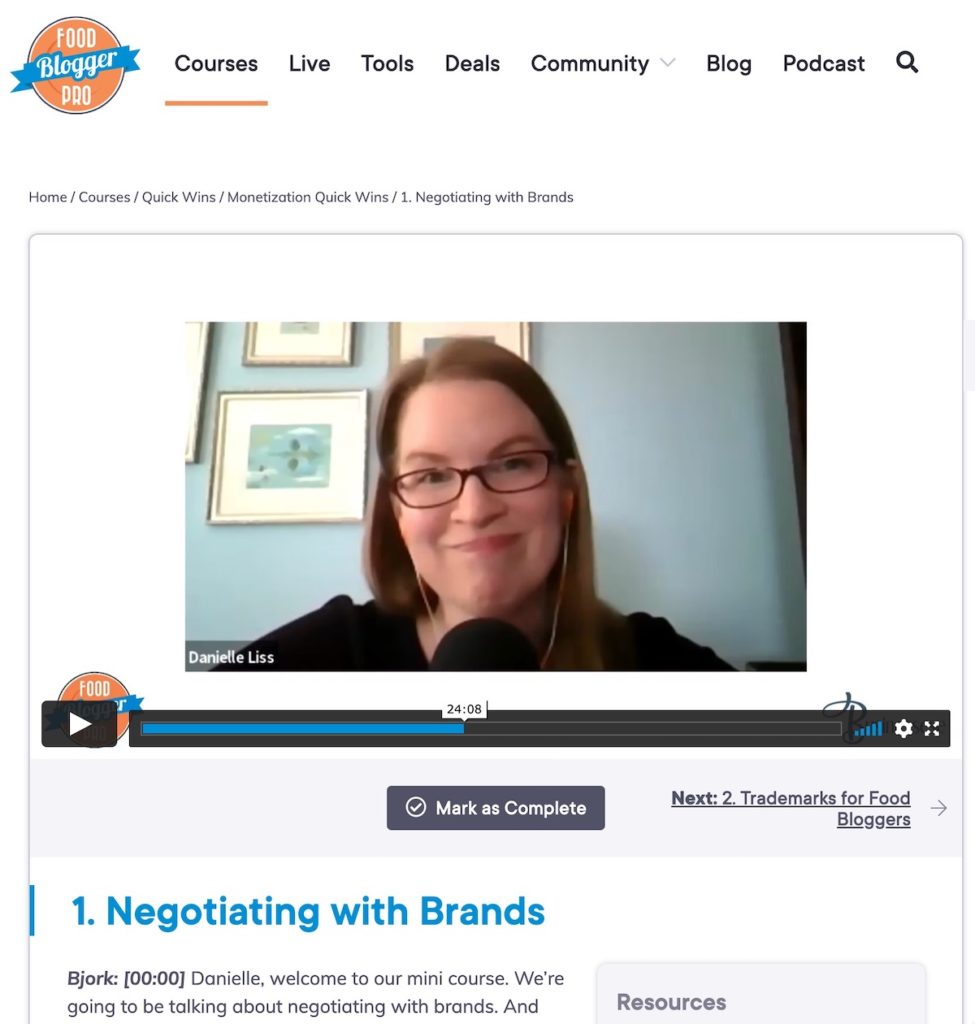Working with brands on sponsored content is one of the most popular ways that food bloggers, influencers, and content creators can monetize their online businesses.
That said, when it comes time to negotiate your rate and your work with a brand, it can get a little intimidating and complicated.
But knowing what to expect by doing some work ahead of time can help you feel more comfortable and confident when you get to the negotiations.
Allow us to introduce to you the concept of MAGIC, a framework created by our Legal Expert, Danielle Liss from Businessese, in our Negotiating with Brands Quick Win lesson available to all Food Blogger Pro Members.
This framework will help you approach negotiating with brands as a collaboration-based exercise, versus one rooted in conflict. It’ll help you identify and articulate what both sides want in a sponsored partnership so that both you and the brand are happy with the contracted work.

Why negotiate with brands?
When you set out to work with a brand, there will be a contract involved that outlines important aspects of the partnership.
As with most partnerships, each side is after a very specific outcome, which is outlined in the contract. On the brand side, they may want to get a new product in front of a new audience or signups to their email list. On the content creator side, you want to get paid what your work is worth.
That’s where negotiations come into play –– they help get everyone on the same page so that both sides of the partnership are happy with the projected outcomes and results.
The MAGIC of Negotiations 🪄
Let’s dive into the MAGIC Framework, shall we?!

M: Map What You Want
This step is all about approaching negotiating with a plan, rather than just blindly diving into a contract discussion.
You’ve worked hard to create your brand, build your audience, and establish trust with your readers, so you’ll want to make sure to protect those in any brand partnership.
Some brands will request that you use specific language in your posts, while others will want more control over the photographs using their products. Some brands may want multiple rounds of edits before a sponsored post goes live, other brands don’t need to see a draft before your post is published.
As a content creator, it’s important to have a list of what I’m okay with and another list of things you don’t want to do before entering into a brand partnership. These lists will be different for every creator, so it’s worth it to take a few minutes to think about what you absolutely need out of a partnership versus what you’re willing to be flexible with.
A: Assess What the Other Side Wants
An important point to understand here is that, as a content creator, you’re helping a brand solve a problem that they have. They wouldn’t be looking for bloggers, photographers, videographers, or content creators if they didn’t have a problem that you could provide the solution for.
So before you enter negotiations, it’s a good idea to look at the deal from the brand’s perspective and figure out exactly what it is that you can do for them; think about what their problems are, what their goals are, and how you and your work can provide solutions for them.
G & I: Gather Insights
This is your chance to take your learnings from the M and the A steps to put it all together into a plan!
This is the step where you can take your “must haves” along with the goals of the brand to say, “Here’s what the brand needs, here’s what I need, and here’s how I think that we come together.”
When it all boils down to it, a negotiation is just a discussion to make sure that everyone involved in the partnership is happy and on the same page. This is where you get specific.
Some of the common clauses you’ll typically see in a contract for sponsored content work include:
- Scope of Work
- Payment Terms
- Ownership of Content
- Exclusivity
- Termination
- Drafts
- Likeness Release
- Reshoots
If you can enter into the contract negotiation phase with a plan for these items based on what you want and what the brand wants, the negotiation phase is nothing to be feared! Advocating for yourself while understanding how your work can help solve a brand’s problems is an important superpower when you start working with brands.

C: Collaborate
Collaboration over conflict; that’s what we’re after in negotiations! If something within a contract that a brand provides doesn’t work for you, ask about it. See if there’s a way to pivot and approach it from a different angle.
For example, if a brand wants to have complete lifetime ownership over the content you create for them, that may be a red flag for you.
Maybe they’d be willing to change the terms in the contract so the brand can license your content on certain, specific channels.
Or maybe they really do need lifetime ownership of the content. In that case, you can charge them more than the original offer since the brand will be getting more value from your work over a longer period of time.
Other times, you may not be able to come to a resolution with a brand, and that’s okay. But because you did some work ahead of time (the M-A-G-I of this framework!), you can be confident in that outcome.
Hopefully this MAGIC Framework can help you enter into contract negotiations with a little more confidence in the future, and if so, we’d love to hear about it in the comments below!
And if you’re interested in learning more about negotiating with brands (including information on all of those common clauses listed above!), Food Blogger Pro members have access to our full 52-minute long discussion with Danielle all about how to handle brand negotiations as a food blogger. Become a member and get instant access today!

Now, we’re curious: Have you ever done any sponsored work? How did you handle the negotiation process?